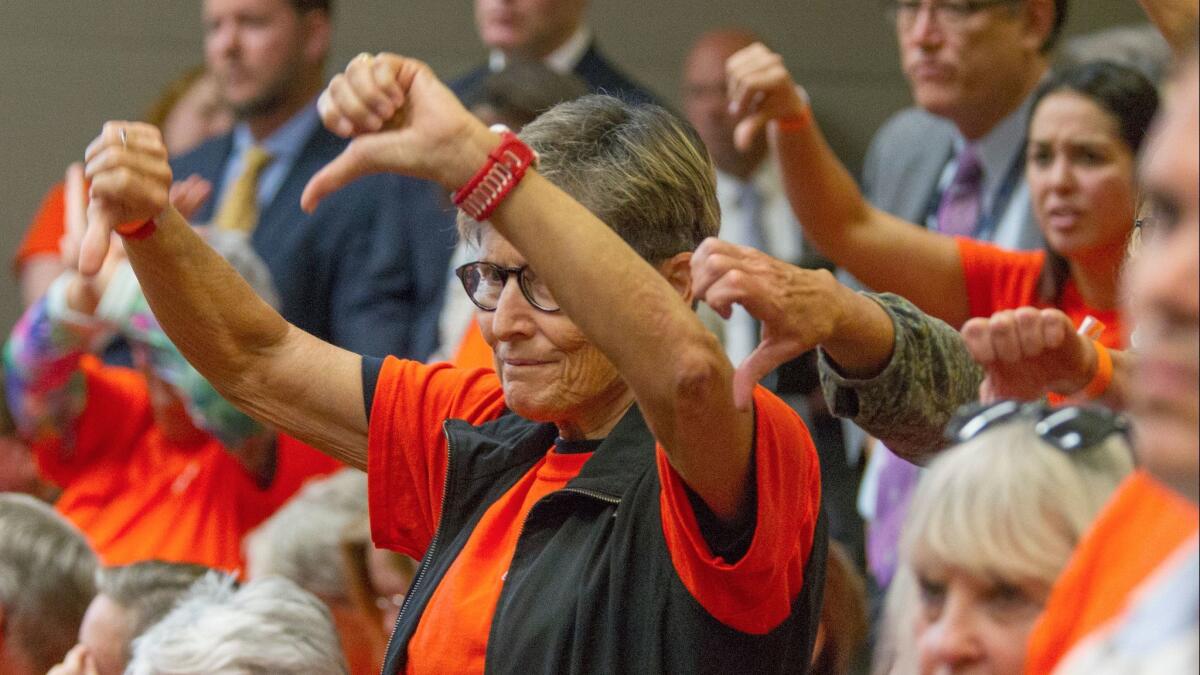Op-Ed: Questions you should ask politicians about guns (according to a politician)

- Share via
My father was murdered by a handgun-wielding assailant, so the firearms debate is personal for me. And I’m routinely disappointed by how disingenuous it is on both sides. I worry that each party just wants to mobilize its base and raise campaign funds rather than solve tough policy problems.
Next time you hear a politician offer a simplistic solution, here are some questions to ask.
If the politician favors gun control:
1. What will tougher laws accomplish when there are already roughly two guns in circulation for every American adult? Are you proposing the mass seizure of firearms? It’s not just the 2nd Amendment that’s at issue, but the 5th, which prohibits the taking of private property without compensation.
2. You say you favor an “assault weapon” ban, but most murders in the U.S. are committed using handguns. Do you have a separate plan to address handgun violence (which occurs daily)?
3. For that matter, do you realize that there is no sound legal or technical definition of an “assault weapon?” The 1994 ban, which expired in 2004, was rife with loopholes. Rather than political catchwords, explain your intentions using terms that have a precise meaning, like “semiautomatic.”
4. You’ve suggested that the 2nd Amendment should be read to protect only the muskets and rudimentary rifles extant at the time the Constitution was drafted. Do you realize how problematic this logic is? Do you believe the 1st Amendment should protect print newspapers but not television broadcasts, web-based journalism, or social-media posts?
5. The Constitution belongs to the people of the United States, and if the requisite supermajorities agree, the people can amend it to reflect changing mores. So have the guts to be honest: Do you believe we should repeal the 2nd Amendment?
If the politician does not favor gun control:
1. You’ve offered “thoughts and prayers” for the victims. Do you realize how trite that sounds? Could you please take the initiative to change your phrasing once in a while? And is there anything besides thinking and praying that you believe you can do?
2. You say you believe the solution is not to pass more gun laws, but to enforce the ones we already have on the books. So what have you done to insist that the relevant agencies do just that?
3. According to the National Rifle Assn., only a good guy with a gun can stop a bad guy with a gun. You’ve extended that logic to schools, advocating that we arm teachers. But most mass shootings happen so fast, there isn’t much time to react. I can’t imagine my first-grade teacher stopping a determined killer, and I don’t believe parents want schools to look like prisons. Besides, is it fair to turn teachers into security guards? Do you really believe arming educators is the solution?
4. The 2nd Amendment confers a right to bear arms, but no constitutional right, even free speech, is absolute. So if you make blanket statements about the 2nd Amendment, why don’t you tell us where you draw the line?
5. Background checks won’t end gun violence. But they can stop a portion of the mentally ill population (or criminals or domestic abusers) from purchasing guns legally. How can you argue that a better system won’t prevent at least some crimes?
Even under pressure, I fear politicians on both sides are neither honest nor realistic on this issue.
But here’s what we can do. The low-hanging fruit if we want to lower rates of gun violence is to address drug use and mental health problems. Large percentages of those incarcerated for violent crimes committed those acts under the influence of drugs or to obtain money to buy drugs. And a large percentage of mass shooters are mentally ill. So try to notice the signs of mental illness and addiction, and do whatever possible to get friends and family the help they need.
Meanwhile, by all means, ask politicians those tough questions.
Mike Gatto, a Democrat, served four terms in the California Assembly. He is an attorney and legislator in residence at USC’s Unruh Institute of Politics. Twitter: @mikegatto
Follow the Opinion section on Twitter @latimesopinion or Facebook
More to Read
A cure for the common opinion
Get thought-provoking perspectives with our weekly newsletter.
You may occasionally receive promotional content from the Los Angeles Times.









